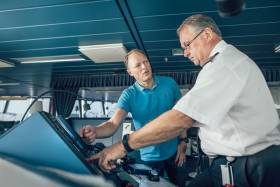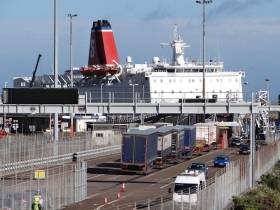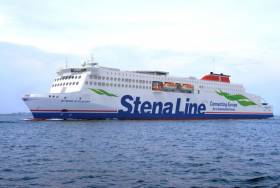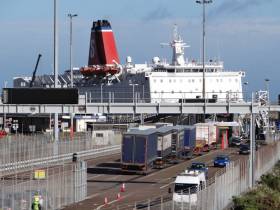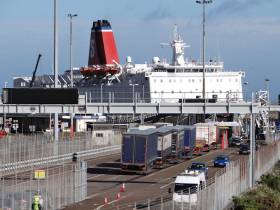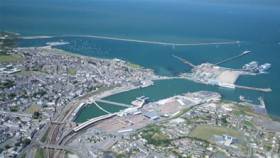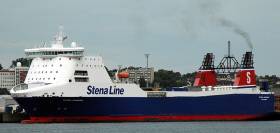Displaying items by tag: Stena Line
Launch of Stena Line's First 'AI' Assisted Ferry
#FerryNews - Scandinavian based ferry giant Stena Line is conducting a pilot study in which artificicial intelligence is implemented on board. The use of AI is an important part of the Swedish operators efforts to reduce fuel consumption and environmental impact.
In close cooperation with Hitachi technology company, an AI model is developed to use on board. The model will anticipate the most fuel efficient way of operating a particular vessel on a particular route, and will be a support for captains and pilots.
If the model is successful, it will contribute significantly to achieving the annual goal of reducing fuel consumption on board by 2.5 percent.
"The model goes through a large number of scenarios before proposing the most optimal route and best fuel optimization settings during the trip. Thanks to AI we now have the opportunity to take into account a large number of factors, such as currents, weather conditions, water depth and speed through water in more combinations than previously possible to do manually, says Lars Carlsson, Head of AI on Stena Line .
The model is under development and it would not have been possible to move on in the project without a dedicated captain and crew. Therefore, the pilot study is conducted on board Stena Scandinavica (Afloat adds an enlarged sister of Stena Adventurer on the Irish Sea). The study is been supervisised by Senior Master Jan Sjöström, who has worked with fuel optimization on Stena Line for the past 40 years.
"As the model is still developing, at the moment, it is perhaps more we who assist AI than the other way around, but it's an incredibly fun and rewarding process. We have made adjustments after each trip for about four weeks and it's great to see how fast it learns and constantly improve, "says Jan Sjöström, Senior Master of Stena Scandinavica.
The goal is to create such a model that it can provide an ultimate decision base for the captain and officers on board when planning a trip. For example, if AI could provide accurate predictions about current conditions, which is one of the more complex factors today, it would help even the most experienced captain or mate.
In addition, the model can also contribute to knowledge and knowledge transfer to the next generation.
"Planning a cruise and steering a ship in a safe and fuel efficient way is a craft. Exercise gives skill, but if a new captain or mate is assisted by AI, the person can quickly learn to fuel optimize. This, in turn, contributes to a more sustainable journey, "says Jan Sjöström.
Stena Line has an overall goal that all operations will be assisted by AI in 2021. The pilot study at Stena Scandinavica, which operates the Gothenburg-Kiel route, is the first of several tests with AI assistance aboard in 2018. The project will be evaluated by the end of the year . Thereafter, it is decided how the operator will proceed with the implementation of AI Assistance on its 38 vessels.
"We are proud to work with Stena Line to develop and implement AI technology that will create value for both the company and the environment. By working together, thus combining business expertise with data and AI, Hitachi and Stena Line have managed to show how digitization can be used to optimize existing conditions and thus create better results, "says Ram Ramachander, Chief Digital Officer at Hitachi Europe Ltd .
The ferry operator is already assisted by AI in several areas, such as administration, finance, service and customer experience.
Armagh Coach Firm Plans to Roll-Out Glasgow Ferry Connected Service Across the North
#FerryNews - A coach company from Co. Armagh writes The Irish News, has announced the proposed roll-out of its popular Glasgow service via Belfast Port to an additional seven locations in the north.
Hannon Coach launched its Glasgow Express in February and following a successful six months is now planning to offer the service to customers in Derry, Enniskillen, Coleraine, Ballymena, Cookstown, Strabane and Newcastle.
The current Belfast to Glasgow service operates twice daily in both directions.
Hannon Coach director, Aodh Hannon said the planned growth in the service is a direct response to increasing demand.
To read more including comments from the director on the new additional services, click here.
Irish Sea Ferries From Stena Receive Prestigious Safety Award
#FerryNews - Eight ferries operating for Stena Line on the Irish Sea have received the prestigious Jones F. Devlin Award from the Chamber of Shipping of America (CSA), acknowledging the skills and dedication of the men and women responsible for safe vessel operations.
According to the CSA, the Jones F. Devlin Awards publicly recognise ‘outstanding achievement’, exemplifying ‘devotion to duty and to the principles of maritime safety, which is worthy of the highest commendation.”
This year, eight Stena Line ferries on the Irish Sea, along with a ninth ship operating on the Gdynia to Karlskrona route have been recognised for operating between two and five consecutive years without a lost-time accident.
The awarded ferries are:
· Stena Adventurer on the Dublin to Holyhead route
· Stena Horizon on the Rosslare to Cherbourg route
· Stena Superfast VIII on the Belfast to Cairnryan route
· Stena Mersey, Stena Lagan and freightferry Stena Precision on the Belfast to Liverpool route. Afloat adds the Irish Sea route is also to be joined by Stena Forerunner which too was given the award. The '4Runner class freightferry is currently on the English Channel as it makes a repositioning voyage to Belfast from Rotterdam.
· Stena Baltica on the Gdynia to Karlskrona route
Bjarne Koitrand, Technical Operations Director at Stena Line said: “Safety for our passengers and employees always comes first at Stena Line, and forms a very important part of the Stena Line Group’s strategy for a sustainable future. This achievement reaffirms the positive trend we have seen in the Lost-Time-Injury-Frequency during the last years.”
Stena Line Trade Director (Irish Sea South) Ian Davies also commented on his pride at a ‘remarkable’ achievement.
“For a ship to operate for three consecutive years without a single lost time accident is a fantastic achievement – for eight of our Irish Sea fleet to pick up this award is truly remarkable,” said Mr Davies. “We really couldn’t be more proud of all our colleagues on the Irish Sea.”
Former Irish Sea Freight Ferry Returns to Familiar Waters
#FerryNews - A former Irish Sea freightferry has in recent days returned to familiar duties running between Northern Ireland and England, writes Jehan Ashmore.
The 120 trailer-unit Stena Scotia entered service on the Belfast-Heysham route to cover a sister, Stena Hibernia which went off service for dry-docking at Harland & Wolff.
Up until 2013, Stena Scotia had operated the Irish Sea route.The 13,017grt vessel had sailed last week from Killingholme on the Humber Estuary, from where Stena Line operate a freight-only service to Hoek van Holland.
Prior to the Irish Sea transfer, Stena Scotia's role on the North Sea was to permit the Dutch route's routine vessel Stena Transit to undergo dry-docking. Otherwise, Stena Scotia also operates from the same Humber port but to Rotterdam.
Earlier in the summer Afloat reported on a pair of larger Belfast-Heysham chartered-in vessels each with a 151 trailer capacity. They are the Stena Precision and Stena Performance which are to be returned to owners Seatruck for operations on the Warrenpoint-Heysham route.
Operator Stena Line Committed to Fishguard Route
#FerryNews- Operator Stena Line continues to remain committed to the Fishguard-Rosslare ferry route, Welsh county councillors have been assured.
Capt Ian Davies, Stena Line’s trade director for the Irish Sea, told councillors Kevin Doolin and Myles Pepper that the company enjoyed a “positive trading position” and “excellent forward bookings” for the summer season.
He was responding to local concerns about the future of Fishguard Port after the County Echo revealed that Stena had scrapped plans for a new £5m linkspan.
The move was seen as a blow to hopes of developing the port by attracting larger vessels.
The two councillors subsequently met with Capt Davies to share in a discussion on Stena’s decision to not proceed with the linkspan project in the short term.
For more on the story from County Echo, click here.
#FerryNews - Ferry operator, Stena Line is set to bring a new giant vessel on the Holyhead-Dublin route reports Daily Post Wales.
Stena Line has confirmed that the first of its new RoPax ferries currently under construction in China is planned to enter service on the Irish Sea route early 2020.
The Stena E-Flexer vessel - which will be among the most energy efficient in the world - will replace the Superfast X on the route.
The new ship will have capacity for 1,000 passengers, 120 cars as well as 3 100 freight lane meters delivering 4 daily sailings with an estimated crossing time of approximately 3.5 hrs.
It is a major vote of confidence in Holyhead at a time where there are concerns about the potential impact of Brexit on the port.
Ian Davies, Stena Line Trade Director Irish Sea South, said: “Freight volumes have surpassed the Celtic Tiger peaks of 2007 and we are confident that this upward trend will continue.
For more on this development including ship stats details, click here.
Plan By Stena to Close for Three Months Fishguard Ferry Terminal
#FerryNews - The south Wales port of Fishguard's ferry terminal could close for up to three months according to the operator, Stena Line.
The temporary closure reports BBC News, would allow for the replacement of the mechanised bridge that links the ferries to the dock in a £5m project.
It is understood that the most likely period is from February next year.
Stena Line said it was "committed to examining the possibilities of investing in key elements of the port infrastructure".
The company is looking at replacing the current Linkspan provision, the key ship-to-shore connection that allows vehicles to board and disembark at different tide heights.
For more on this development, click here.
What Could Leaving EU Mean for Port of Fishguard? - Post Brexit
#FerryNews - Of all the stories that have come out of Brexit and Wales, the impact or otherwise on the country's port links with Ireland has been one of the biggest.
Wales so writes BBC News, has three ports that link Great Britain to Ireland, with warnings of long queues if, as a result of whatever Brexit negotiations produce, customs and border checks are needed.
One port, Holyhead, has had much written about it - with concerns new checks could result in delays and disrupt its business model.
But the smaller Port of Fishguard in Pembrokeshire, with its own roll-on, roll-off service, has also been a focus of some concerns.
- 'Free ports' urged to boost business
- Holyhead 'extra-complexity' post-Brexit
- Concern about Holyhead port
- 'Danger' to Welsh ferry ports
An assembly committee report last year found 100,000 lorries were carried to Ireland via ports in Pembrokeshire in 2015 - a third of those through Fishguard.
The UK government said it did not want a so-called "hard border" with Ireland and it is unclear what, if any, impact the final Brexit settlement would have on Wales' ports.
Jeremy Martineau, secretary of the Fishguard and Goodwick Chamber of Trade, said the organisation, which has 140 members, does not have a view on Brexit.
But asked what he thought personally about the impact of leaving the EU on the town, the Remain voter said: "It depends on what happens with the Ireland/Northern Ireland border."
He feared border checks would deter commercial traffic from using the link - something he said was more significant than passenger traffic - and was concerned about direct routes from Ireland to the continent being developed.
For further reading on the story click here.
£4m Investment by Stena Line to Upgrade Holyhead Port
#FerryNews - More than £4m by Stena Line is to be spent on upgrades to improve infrastructure at the Port of Holyhead after recording a record year for freight growth.
The upgrades will include the creation of additional freight space at the Port and also extensive refurbishment to the Terminal 3 ramp. The work began last Friday and is take approximately five days to complete.
Captain Wyn Parry, Stena Line’s Irish Sea South Ports Manager, said: “We’re always looking at ways to improve our facilities for our freight and travel customers and the two upgrades will certainly have a positive impact on our ability to remain competitive and efficient.
“The new lower deck of T3 was fabricated by McGregor Ltd and transported to the Port by barge. Unfortunately the exchange to the new linkspan will mean a minor inconvenience to Port customers but we have worked hard to minimise the impact.”
35,000 Calves Expected to Travel on Replacement Ferry to the Continent
#FerryNews - Around 35,000 calves are expected to be exported via the replacement ferry on the Rosslare-to-Cherbourg route during the four-week period that the Stena Horizon is out of action.
According to Agriland, the Minister for Agriculture, Food and the Marine, Michae Creed, confirmed that the Stena Carrier will takeover from the Stena Horizon on February 20, when it goes into dry dock for maintenance.
But, the the department added that it is difficult to predict future market developments. Further lesser numbers are also expected to be exported on the Dublin-to-Cherbourg route.
Commenting on the approval of the Stena Carrier, Minister Creed said: “Since this issue of the withdrawal of the Stena Horizon from service for routine maintenance first came to notice in October 2017, senior officials from my department have been actively engaging with all relevant stakeholders on the matter.
For more on the story, click here.


























